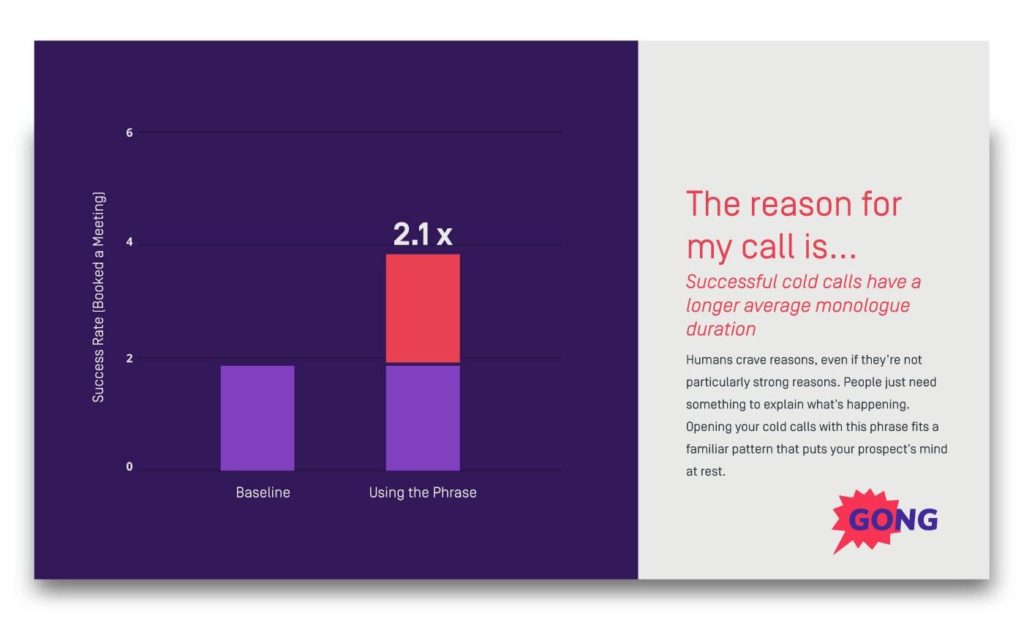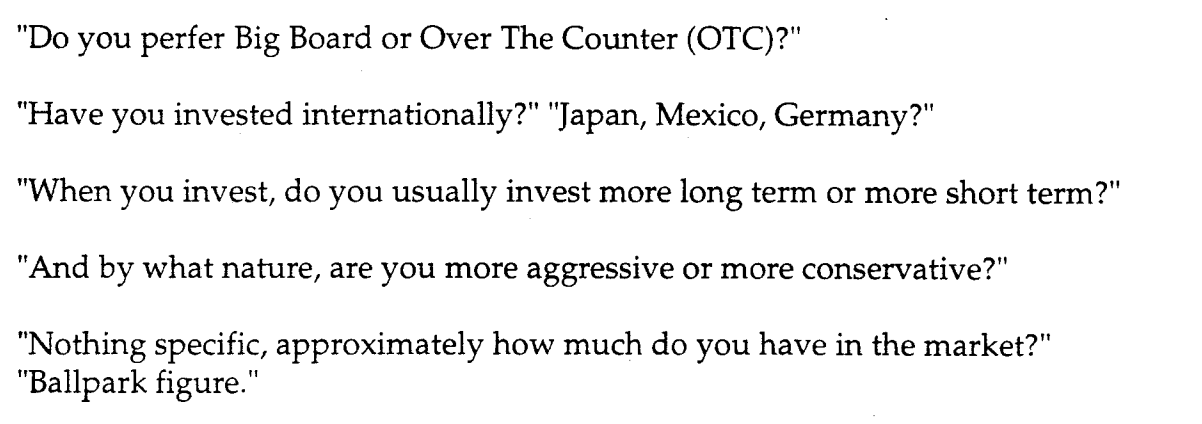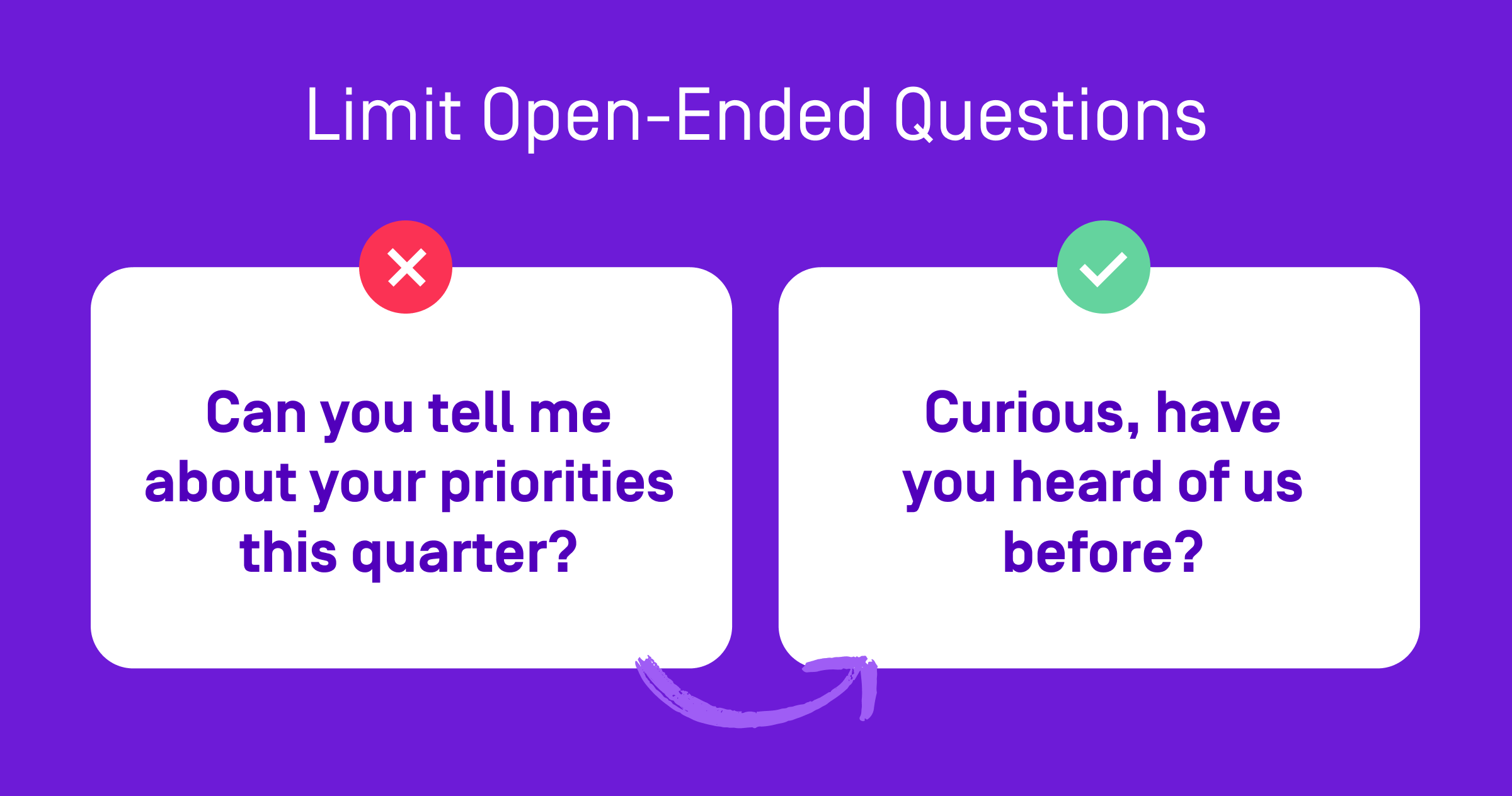6 Sales Tips From The Wolf Of Wall Street Original Cold Call Script
September 10, 2021Stratton Oakmont, Inc.* was a Long Island, New York, “over-the-counter” brokerage house founded in 1989 by Jordan Belfort and Danny Porush. It defrauded many shareholders, leading to the arrest and incarceration of several executives and the closing of the firm in 1996 (Wikipedia).
The 5-time Academy Award-nominated 2013 film, The Wolf of Wall Street, was based on the memoirs of Jordan Belfort.
We recently uncovered the ORIGINAL cold call script used as the training guide for all sales reps at Stratton Oakmont. It’s pretty incredible. And worth reading through all 76 pages.
There’s an article from Napoleon Hill on personal achievement, one from Carl May on the strategy for winning, and a selling power piece from Les Brown.
There are quotes about persistence and ABC (Always Be Closing).
And there’s an entire section on cold calling scripts — complete with objection handling for just about every scenario you can imagine.
It has do’s and don’ts and pitch scripts. Terms and definitions. A time-zone map. And a “Phone Faux Pas” article from Entrepreneur magazine, March 1995.
It’s chock full of scanned copies of articles + handwritten notes + typed (then scanned) checklists. Oh, and there are a lot of ALL CAPS.
In short, it’s pretty epic.
We gleaned 6 sales tips from this 1990s, 76-page sales playbook, and share how they apply to sales in the 2020s.
Let’s dive in.
*Disclaimer: Gong, nor the author of this blog post, nor anyone associated with Gong or the author of this blog post condones the business of Stratton Oakmont. We are simply looking at the method and applying tidbits presented nearly three decades ago that are, surprisingly, still relevant today.
Tip #1: State your full name and company name
As soon as your buyer picks up the phone, start talking.
But don’t just blurt out words.
Lead with intention. Specifically, your full name and company name.
Direct from the Stratton Oakmont script:

“Hi, Steve. My name is Jonathan Costet. I’m calling from Gong in San Francisco.”
Why we recommend this approach:
- People who introduce themselves with their full name and company name command respect. Important people don’t introduce themselves with only their first name. Instead, they share their full name.
- Stating your full name and company name upfront helps to maintain control. Whoever asks the questions controls the conversation — especially during cold calls. If you fail to state these facts at the start of the call, the person on the other end is bound to ask, “Who is this, and who are you with? They now have control. You? On the defensive.
Not a great place to start.
Better to lead with (and maintain) control.
Tip #2: State your reason for the call
The Stratton Oakmont sales call script is a tad bit outdated.
“Very simply sir, with your permission” and the offer to “forward a complimentary issue” (without a doubt a hard copy, snail-mailed magazine) are, well, maybe not the best way to proceed on a cold call.

But the part I want to call out is how they state their reason for the call: “introduce myself and my firm…”
Gong data show this to be a successful, winning approach.
Opening your call by stating the reason for calling increases your success rate by 2.1x:

Humans want crave reasons, regardless of how strong the reasons are. So leading with this approach (and precisely, this phrase) puts the buyer’s mind at ease.
Tip #3: Use closed questions
When it comes to sales questions, there are two types:
Open-ended: These questions are intended to elicit more prolonged, more personalized answers. They could look like, “Tell me about what keeps you up at night?”
Closed: These questions are intended to be rapid fire. They can be answered with a single word or a short phrase. Often they are yes/no questions.
The closed question example from Stratton Oakmont (screenshot below) reads, “Are you familiar with the name Stratton Oakmont?
The answer is yes or no (or maybe?).

Note the “if yes” follow-up question — also closed.
The Stratton Oakmont sales script continues with closed qualifying questions:

All answers are short (“OTC” OR “Yes, in Japan” OR “More aggressive”) or yes/no.
Before we lean into closed questions more, a quick note about open-ended questions. Generally speaking, these types of questions are wonderful as they allow buyers to provide rich, detailed answers that give sellers actionable content for later use.
But when it comes to cold calls, you have a buyer on the other end of the horn who is doing a constant mental calculation: Is the effort-to-reward ratio favorable enough to remain on the line?
A “Tell me about your priorities this quarter” type question is not going to cut in on a cold call. See this cold calling example:

Closed, easy-to-answer questions help you steer the conversation and maintain that ever-important control.
Fair?
Tip #4: Use the word “fair.”
Speaking of…
Did you notice the last (short) closed question in Tip #2? Here it is again:

Fair enough?
“Fair”— one of the most powerful words in the English language — also happens to be one of the 7 words that sell.
You see, us humans have a deep, innate desire to be perceived as fair AND to receive what is fair.
American businessman, author, and academic (and former hostage negotiator) Chris Voss refer to “fair” as “the F-word,” saying it’s the “single most powerful word in any negotiation.”
Gong data show top performers use the word “fair” 1.7x per deal (i.e., all calls that span one deal), while everyone else uses it to 0.2x.
Just be careful not to OVERuse “fair.” In other words, don’t end every sentence with, “Is that fair?? Or “Fair enough?” Use it sparingly.
“Fair enough” is a solid tactic to move deals forward.
For example: “I’m happy to walk you through this demo. The only thing I ask is that if you think this makes sense, we schedule a concrete next step at the end of this call. Is that fair?”
And… meeting booked.
Tip #5: Have your objection handling game on the ready
There is an entire section devoted to objection handling in the middle of the Stratton Oakmont sales script packet.
This one stood out to me the most:

(sound sincere) << Ha!
Again, some of the language here is a bit outdated. Do people really still answer their calls while in a meeting? Maybe the true multi-taskers. “… people in my office as well …” Maybe.
But the basic premise of the objection (O) is real, as are the rebuttals (R). The objection-handling script should follow three key points:
- Acknowledge the situation: “I totally understand and hear you.”
- Lean in with humor to show authenticity and human-ness: Authentic humor is the key here.
- Get right to “the reason we’re different” part. Make it about them.
Be ready for all types of objections — the common ones and the not-so-common ones.
This is a perfect opportunity for a Gong call library folder with the best-of-the-best objection handling calls.
Tip #6: Focus and mindset win the day
Page 15 in the Stratton Oakmont sales script is one for the ages, albeit outdated in certain sections (“Listen to what the man says.”).
It leads with 6 on-point, direct sales tips and then flows into 7 “Dont’s” such as “Don’t pick up bad habits” and my favorite* — “Don’t ever waste time talking and screwing around with other brokers or trainees.”
HOW DARE YOU WASTE TIME SPEAKING WITH CO-WORKERS!
*Favorite = funny LOL. We strongly encourage collegiality and a team atmosphere at Gong!
However…
The “Why” section at the end of this page is where it’s at.
Replace “he” with “your buyer,” and it reads like gold:

Modified to 2021-type language:
-
- If your buyer is up and you are down = your timing is off. It’s not going to happen today.
- If your buyer is down and you are down = your timing is off. It’s not going to happen today.
- If your buyer is down and you are up = your timing is off. It’s not going to happen today.
- If your buyer is up and you are up = today is an excellent day for all.
Attitude and mindset go a long way. But, unfortunately, you can’t control what others say and do. You can only be in charge of how you reply, of what you bring to the conversation.
Don’t let a lousy call shake your confidence.
*Another disclaimer: The Stratton Oakmont sales script (and Wolf of Wall Street movie) are walking HR violations. The culture is not replicable and certainly isn’t recommended or encouraged at all.
1994 to 2021: How far we’ve come as sales reps (or have we?)
This Stratton Oakmont sales piece looks to be published and distributed “for training purposes only” in the mid-90s.
It’s possible — quite likely — you were not even born yet.
However, outdated language and HR nightmare content aside (see all aforementioned disclaimers), it has some evergreen sales tips peppered throughout the 76 pages.
Glean what you can from the 1994 script and apply it to how you sell today.
Oh, and while you’re here, grab our 3 highly effective cold calling scripts for some 2021-style selling tips.
